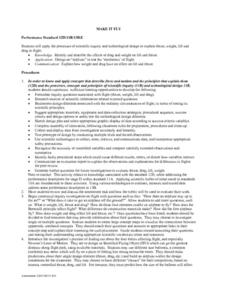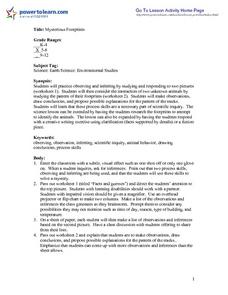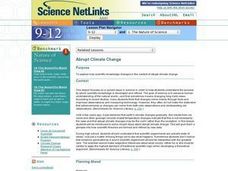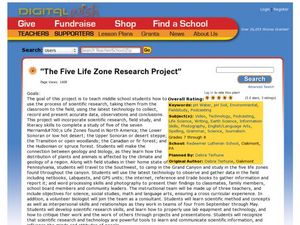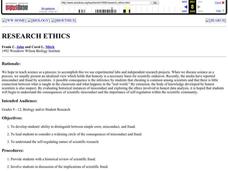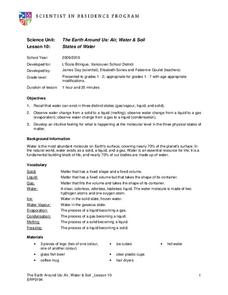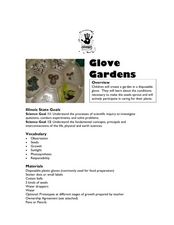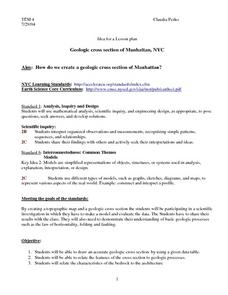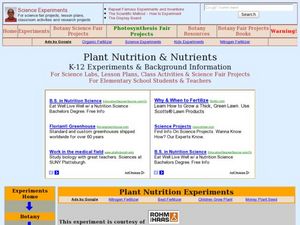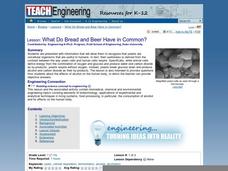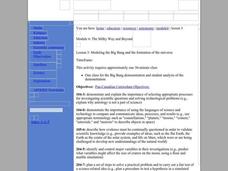Curated OER
Designing a Crew Exploration Vehicle
Take your class on an out-of-this-world adventure with this fun engineering design lesson. Working in small groups, young scientists design, build, and test crew exploration vehicles using some creativity, teamwork, and an assortment of...
Chymist
Build a Spectroscope
Assist your emerging scientists with construction of their very own spectroscopes. Individuals construct a spectroscope to identify elements used in varying lights within a particular environment. They conclude the activity with a class...
Curated OER
Inventing and Presenting Unit 1: Analyzing Nonfiction and Inventing Solutions
Students read about and identify patterns in the invention process. Students discuss and write about information learned from research. Students compile a list of problems, choose one, write a problem statement, and compile a list of at...
Curated OER
MAKE IT FLY
Students utilize the process of scientific inquiry and technological design to explain thrust, weight, lift and drag in flight. They design an "airplane" to test the "mechanics" of flight. In addition, they brainstorm and sketch a design...
Curated OER
Creeping Sheets of Ice
Students conduct scientific investigation in which they observe glacial
effects on landscape, develop and explain their own theories of how glaciers change land, and demonstrate understanding and explain basic motion and force principles.
Curated OER
Backyard Critters
Young scholars explore the characteristics of invertebrates in their backyards. They observe, describe, and classify specimens. They conclude with a "snail race."
Curated OER
Mysterious Footprints
Students, after observing and responding to two pictures, consider the interaction of two unknown animals by examining the pattern of their footprints. They make observations, draw conclusions and propose possible explanations for the...
Curated OER
What Influences Reaction Rate?
Learners study reaction rates, what determines how fast a reaction happens and how the chemical changes occur. In this reactions lesson students complete a lab where they use Alka-Seltzer to observe reaction rate and create a graph with...
Curated OER
Abrupt Climate Change
High schoolers explore how scientific knowledge changes in the context of abrupt climate change. They are introduced to some recent ideas about abrupt climate change. This gives them a glimpse into how scientific theories are formed and...
Curated OER
Simulating the Greenhouse Effect in a Terrarium
Students identify what factors effect global warming and how the greenhouse effect occurs. In this environmental lesson students view videos then complete an experiment using a terrarium to observe greenhouse gas.
Curated OER
What is all the Fuss about?
Students brainstorm a list of science discoveries and inventions that they think are important. They work in small groups, students examine 1-3 science discoeries more closely. Each group needs a recorder, and they answer three...
Curated OER
The Five Life Zone Research Project
Students study five of the seven life zones in North America. In this journalism lesson students use the Scientific Method working in teams. They use lab equipment and technology to create a presentation on five of the seven life zones...
Curated OER
Frost Depth
Learners explore the concept of frost depth. In this frost depth lesson, students conduct a scientific investigation that requires them to use a frost tube to measure, record, and graph frost depth data.
Curated OER
Making Cents of Density
Middle schoolers utilize their knowledge of the physical properties of matter such as mass, volume, and density to solve a problem. They utilize the scientific method to solve a problem. Pupils analyze their data to determine whether...
Curated OER
Research Ethics
Students develop an ability to distinguish between simple error, misconduct and fraud. Students are lead to consider a widening circle of the consequences of misconduct and fraud. They expand their knowledge on the self-regulating...
Curated OER
States of Water
Students investigate the 3 states of matter. In this physical science "matter" lesson, students observe and participate in a number of demonstrations involving melting and freezing water. Students observe the effect heat has on changing...
Curated OER
Glove Gardens
Students investigate how seeds sprout. In this scientific inquiry lesson, students make predictions on which seeds will grow the fastest and observe the seeds over a period of time. Observations are recorded into a journal.
Curated OER
Air Is there
Learners experiment to observe air and its mass. In this air lesson, students use the scientific method to complete experiments that demonstrate the properties of air. Learners view a video as follow-up.
Curated OER
DIY Lava Lamp
Students examine lava lamps and what causes them to work. In this density instructional activity students make a lava lamp and write the scientific explanation of what happens.
Curated OER
Geologic cross section of Manhattan, NYC
Students draw an accurate geologic cross section by using a given data table. They relate the features of the cross section to geologic processes. Students then relate the characteristics of the bedrock to the architecture.
Curated OER
Me And My Shadow
Students investigate the concept of a shadow. They design a tool to create shadows for an experiment. They make observations and record the size and shape of shadows. The lesson contains background information for the teacher to deliver...
Curated OER
Plant Nutrition and Nutrients
Students observe seeds growth and examine the different parts of the seedling. In this biology lesson, students compare the growth of seeds planted in soil and in hydroponics. They record their observations in their science journal and...
Curated OER
What Do Bread and Beer Have in Common?
Students listen to an explanation of yeast cells and how they effect bread and beer. They discuss the ways alcohol affects the human body and participate in an indirect observation about cell respiration in yeast-molasses cultures.
Curated OER
The Big Bang Theory
Students will use scientific reasoning to formulate ideas about the formation of the universe using the Big Bang Theory. The use of critical thinking skills is part of the activity and the foundation of the scientific method will serve...





